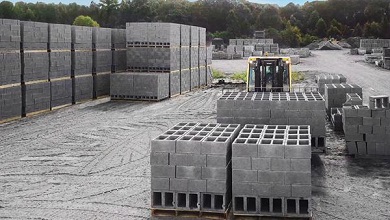 LOS ANGELES—Blair Block has begun commercial production of the world’s first ultra-low carbon concrete blocks at its concrete masonry production facility in Childersburg, Alabama. The new blocks leverage CarbonBuilt’s proprietary technology that reduces embodied carbon by 70-100+ percent compared to traditional concrete blocks. The blocks, which cost no more to produce than traditional concrete, will be used by C&C Masonry in the construction of several municipal projects across the state of Alabama.
LOS ANGELES—Blair Block has begun commercial production of the world’s first ultra-low carbon concrete blocks at its concrete masonry production facility in Childersburg, Alabama. The new blocks leverage CarbonBuilt’s proprietary technology that reduces embodied carbon by 70-100+ percent compared to traditional concrete blocks. The blocks, which cost no more to produce than traditional concrete, will be used by C&C Masonry in the construction of several municipal projects across the state of Alabama.
“This is not only a milestone for CarbonBuilt and Blair Block, but also for the broader concrete and building materials industries,” said Rahul Shendure, CEO of CarbonBuilt. “We’ve shown that it’s possible to massively reduce carbon emissions from concrete production without compromising on cost or performance. We look forward to replicating this success at concrete masonry plants around the country.”
CarbonBuilt’s technology replaces most of the expensive, high carbon Portland cement used in concrete manufacturing with a proprietary low-cost cement alternative made from widely available, low carbon materials. These materials harden by chemically reacting with CO2, piped into the curing chamber from an onsite furnace that also generates heat needed for the process. The furnace uses waste biomass that would have otherwise produced carbon emissions. This process not only strengthens the blocks, but also permanently stores the CO2 in solid form.
An Industry First
“As a family-owned business, we’re incredibly proud to be the first plant in the world to produce ultra-low carbon concrete,” said Matt Blair, an owner, and Vice President of Blair Block. “We’re now able to offer customers a highly sustainable and sought-after building material while positioning our business for the future.”
The first blocks off the line will be used by C&C Masonry, a leading masonry contractor which has completed more than 400 projects including schools, apartment buildings, university buildings and justice centers. C&C will begin integrating the ultra-low carbon concrete blocks, which meet the same specifications as traditional block, into both existing and new contracts in the coming months.
Among the projects getting the new block is the new firehouse in West Montgomery’s Fairview Avenue district, a historically underserved part of the city for which Montgomery Mayor Steven L. Reed is working to attract new investment and development. The ultra-low carbon concrete blocks will be seamlessly integrated into the project, replacing traditional blocks at no additional cost.
Made Locally for Local Project
“We are proud to be the first project in the world to use these new ultra-low carbon blocks, made right here in Alabama,” said Mayor Reed. “Through our Montgomery Forward initiative, we’ve made a promise for a safer, more equitable and vibrant Montgomery. We can now add ‘sustainable’ to that list.”
“It’s business as usual for us,” said Scott Cunningham, owner of C&C Masonry. “Thanks to Blair Block and CarbonBuilt, we’re now able to offer a much more sustainable option to customers without changing the way we operate, asking our masons to handle heavier blocks, or asking our clients to pay more. Everybody wins.”
The first converted line at Blair Block will avoid at least 2,000 tons of CO₂ emissions plus remove more than 500 tons of atmospheric CO2 per year. Through process optimization and integration of additional lines, Blair Block and CarbonBuilt expect to increase this impact over time. A complete carbon accounting will be available in 2024 when the facility obtains an Environmental Product Declaration (EPD) which requires one full year of operational data.
The concrete block, of which more than 1.5 billion are produced in the U.S. each year, serves a vital role in home, school, commercial and industrial facility construction and is poised to play an even more important part in society’s efforts to build structures that are both resilient and sustainable. Given their strength, durability, fire resistance, energy efficiency, and noise abatement, concrete blocks are ideal for construction in regions prone to fire, hurricanes, and tornados. Their low carbon potential relative to poured concrete makes ultra-low carbon concrete blocks a crucial tool for reducing global emissions, while their low-cost profile relative to other building materials gives concrete blocks an advantage in accelerating the transition to lower embodied carbon in the built environment.






